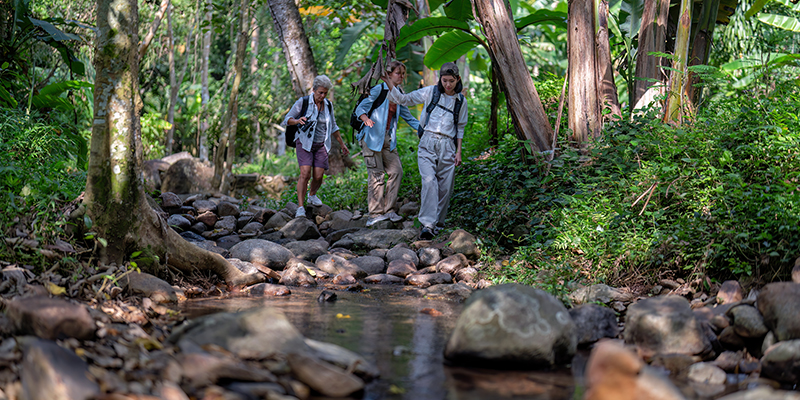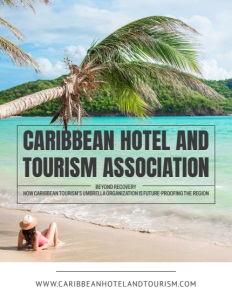Beyond Recovery: How Caribbean Tourism’s Umbrella Organization Is Future-Proofing the Region
From AI Adoption to Advocacy Wins, a Multi-Pronged Strategy is Reshaping How 32 Caribbean Destinations Compete in Global Tourism Markets.
Caribbean tourism has shattered pre-pandemic records, with international arrivals reaching 34.2 million visitors in 2024 and cruise passengers hitting 33.7 million, solidifying the region’s position as the world’s fastest-recovering tourism market. Behind this remarkable performance is an organization that has quietly orchestrated industry advocacy, education, and coordination across 32 destinations for over six decades.
The Caribbean Hotel and Tourism Association, which began in 1959 as a hotel lobby committee, has evolved into the region’s most influential hospitality voice, representing over 1,000 members with approximately 91,000 hotel rooms. “We are an association made up of 32 destinations in the Caribbean and we are sort of an association of associations,” explains Sanovnik Destang, the organization’s president since September 2024. “You could consider us as a chamber of commerce for the Caribbean’s hospitality and tourism sector.”
Operating from Miami headquarters as a federation of national hotel associations, CHTA has become the recognized representative of Caribbean hospitality among international development agencies including the European Union and InterAmerican Development Bank. “Generally speaking, most destinations are well ahead of where they were pre-COVID,” Destang notes. “The Caribbean was actually the region of the world that was the fastest to recover from the pandemic.” Yet challenges loom as economic uncertainty in major source markets creates headwinds for continued growth.
Trade Shows and Networking
CHTA’s flagship Caribbean Hotel and Tourism Marketplace is the region’s largest trade show dedicated exclusively to Caribbean tourism. This year’s event in Antigua marked a first for the destination, continuing the association’s strategy of rotating the marketplace across member territories to maximize regional participation and economic impact.
“We host a few events and the major one being the Caribbean Hotel and Tourism Marketplace,” Destang explains. “We bring our tour operators, online travel agents, traditional travel agents, wedding planners, meetings and incentives planners, and a whole host of other buyers to the Caribbean to meet with our member hotels.” The event’s exclusivity differentiates it. “It’s the largest trade show of its type that is focused solely on the Caribbean. You’ve got a world travel marketplace, but that’s a whole world. This is the only one that connects to the whole world, including US, UK, Canada, Latin America, Caribbean operators with our members.”

The marketplace generates substantial business activity, with deals and transactions completed during the intensive networking sessions. Beyond immediate revenue opportunities, the event provides crucial market intelligence that shapes regional marketing strategies. “It allows us to get a pulse of where the market is at and to sharpen our marketing strategies,” Destang notes. The association’s upcoming Caribbean Travel Marketplace in Antigua and Barbuda for 2025 will be only the third time the event has been held in the Eastern Caribbean, featuring enhanced experiences including the Linkages Trade Show and Responsible Tourism Day.
The Direct Booking Transformation
Recognizing the growing importance of digital channels in hotel distribution, CHTA launched its first Caribbean Direct Booking Summit in Antigua. “Something we did differently this year, realizing how important digital marketing and direct channel has become, we hosted the very first edition of the Caribbean direct booking summit,” Destang explains. “We had about 80 hoteliers, the largest group of Caribbean hotels we’ve ever had, focusing on digital marketing and direct bookings.” The summit introduced cutting-edge techniques including artificial intelligence applications, email marketing optimization, Google Ads management, and meta search strategies.
The event showcased remarkable transformation stories from within the region. “We had one hotelier from the Caribbean who shared their story of how they were able to go from being very OTA-dependent to getting 90% or more of their business direct, which was really incredible,” Destang notes. This success story illustrates the summit’s core philosophy of balanced distribution rather than eliminating online travel agencies entirely. “It’s really not about one versus the other, but about making sure that your distribution and where you get your business from is balanced.”
AI as Tourism’s Great Liberator
CHTA became one of the first hotel associations globally to produce an artificial intelligence guidebook specifically for its members, releasing the initial edition in late 2023 and following up with an expanded second version in 2024. “When I came in, I said three of my focus areas would be on people development, linkages between tourism and other economic sectors, and technology,” Destang explains. “We were at the time the very first hotel association I’m aware of in the Caribbean, probably in the world, that produced a guidebook specific to our members to showcase to them the potential.” The second edition addresses practical implementation while dispelling common misconceptions about AI’s role in hospitality.
The guidebook tackles the industry’s biggest fear directly. “We actually had a section dispelling five myths about AI, including that big one that’s on everyone’s mind: is it going to replace my job? Is it going to replace human beings?” Destang says. “I’ve always felt as an early adopter myself of ChatGPT and other AI tools that this isn’t the tourism job killer, it’s a tourism job liberator.”

This technology frees staff from routine tasks to focus on personalized service. “Instead of the front desk agent having to answer mundane questions about the Wi-Fi password and making dinner reservations, the AI can handle those things,” Destang notes. “It now frees you up to provide that real personalized service that can only be provided in the Caribbean.” CHTA has established partnerships with the Hospitality Financial and Technology Professionals association, providing members free access to their annual technology trade show.
Building Workforce Excellence and Industry Knowledge
CHTA operates two major educational platforms that serve different segments of the hospitality workforce. The Caribbean Hospitality Industry Exchange Forum, typically held in Miami but moving to Barbados for the first time, targets operations staff and middle management with practical training sessions. Meanwhile, the CHTA Education Foundation, established in 1986, administers one of the Caribbean’s largest scholarship programs for industry personnel.
“We have our second big trade show called CHIEF. It’s basically an educational forum with a trade show component that is more directed at people in operations and middle management,” Destang explains. The program covers essential operational areas including human resources, cost savings, sustainability, and customer service. “We’re taking a few different approaches, introducing some shorter sessions, more like TED talks, we call them CHIEF talks, dealing with everything from how to provide authenticity in your experience to sustainability linked to cost savings.”
The education foundation creates pathways for career advancement throughout the region. “Our sister organization, the CHTA Education Foundation, raises funds that are then used to provide scholarships to employees in the hospitality industry,” Destang notes. “It’s so interesting, whenever we do island visits, we meet people who are CHTA scholarship holders. One of them is a minister of tourism who got a CHTA scholarship and is now at the top of the industry from a public sector standpoint.”
The foundation maintains partnerships with prestigious institutions including Les Roches in Switzerland, enabling employees to pursue degrees up to the master’s level. Recent initiatives include partnerships with George Washington University and expanded professional development programs.
Strengthening Local Economic Linkages
CHTA has elevated economic linkages beyond traditional sustainability checklists, creating a dedicated task force to ensure tourism generates broad-based economic benefits across Caribbean communities. Destang appointed former CHTA president Nicola Madden-Greig to lead this initiative, bringing together manufacturers, purchasing managers, and arts sector representatives to develop comprehensive sourcing strategies.
“I basically think that if tourism is not having an economic impact on all different sectors, then it’s not sustainable,” Destang explains. “Sustainability is not just about checking off some things on a checklist for a Green Globe audit.” The approach emphasizes practical economic integration through local procurement wherever possible. “One of the criteria that we do very well in is our linkages to the economy, sourcing locally, whether it’s produce, furniture, wherever you can, local manufacturers.”
The strategy addresses a fundamental challenge facing Caribbean tourism. “It’ll be very hard to sustain and get the support of the local populace if the average person isn’t feeling the impact of tourism,” Destang notes. Additionally, the Caribbean Travel Forum provides a platform for addressing regional connectivity challenges that hinder intra-Caribbean business. “I can’t go to Jamaica directly, I have to go to Miami, fly over Jamaica to Miami and fly back and overnight,” Destang explains, highlighting infrastructure barriers that the association actively works to resolve through public-private sector collaboration.
Protecting Caribbean Interests
CHTA’s advocacy efforts have delivered measurable economic victories for the Caribbean tourism sector, with recent successes including preventing tax policy changes that could have devastated hotel operations and securing exemptions from costly shipping regulations.
“Within weeks of my presidency, we were aware that in the Dominican Republic, the government had made a recommendation to withdraw tax incentives for all businesses, including tourism businesses, which would’ve had a tremendous impact,” Destang explains. The association mobilized quickly with research-backed advocacy. “We found out about it on a Wednesday. We had a statement in Spanish supported by research advocating for them to keep the tax incentives. By Thursday we had an English version, and on Friday and Saturday afternoon, we found out that the tax bill had been withdrawn.”
CHTA’s advocacy includes US trade policy affecting Caribbean operations. The association successfully lobbied against hefty fees proposed for ships built in China, which would have dramatically increased shipping costs to the region. “Through our lobbying efforts and working with Caricom and local shipping companies based in the US itself in Florida, we were able to get an exemption for the Caribbean from that,” Destang notes.

The association also promotes alternative energy adoption across member destinations. “We’ve done a few position papers on sustainability and alternative energy to provide advice to governments and the private sector as to how we can really harness solar, wind and other sustainable energy in the Caribbean.”
As Caribbean tourism continues evolving amid global economic uncertainties, CHTA’s multifaceted approach of education, technology adoption, and strategic advocacy positions the region’s hospitality sector for sustained growth while preserving the authentic cultural experiences that define Caribbean tourism’s competitive advantage.
AT A GLANCE
WHO: Caribbean Hotel and Tourism Association (CHTA)
WHAT: Regional hospitality industry federation representing 32 destinations with over 1,000 hotel and allied members
WHERE: Headquartered in Miami, Florida
WEBSITE: www.caribbeanhotelandtourism.com



